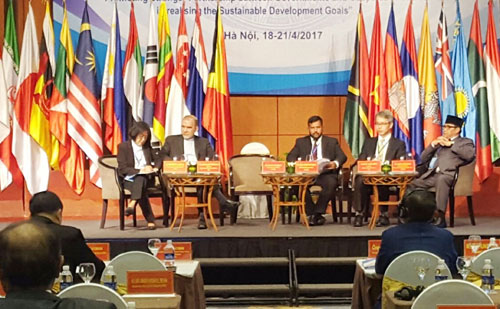Sri Lanka’s first National Cooperatives Policy due by end 2017
View(s):
Minister of Industry and Commerce Rishad Bathiudeen (centre) along with other dignitaries at the 19 April session of the International Cooperative Ministers' Conference 2017 in Hanoi, Vietnam.
Sri Lanka says it’s enlisting its massive cooperative sector for a speedier realisation of the 2030 national Sustainable Development Goals (SDG) plan.
“I stress that we can achieve our national Sustainable Development Goals easily if the government and the cooperative movement works together. Sri Lanka’s cooperatives are active in many sectors, and it can support SDGs as a community based movement,” said Minister of Industry and Commerce Rishad Bathiudeen in Hanoi, Vietnam this week.
Sri Lanka’s cooperative sector has 14500 societies active across the country in multiple sectors- agriculture, consumers, production, health services, industries, financial, fuel distribution, health, women and youth, etc. The Sri Lankan ministry with the support of the ILO currently working on the final stages of the introduction of Sri Lanka’s first ever National Cooperatives Policy, expected before the end of this year.
Minister Bathiudeen was leading Sri Lanka’s cooperative sector delegation to the International Cooperative Ministers’ Conference 2017 at Melia Hotel, Hanoi, Vietnam. The event, according to a media release from Mr. Bathiudeen’s ministry, was held on the theme “Sustainable Development Goals and Promoting Stronger Partnerships between Government and Co-operative Stakeholders”.
He said: “As the minister in charge of the Sri Lankan cooperative sector I stress that this is a timely theme specially for Sri Lanka since at present we are reaching the final stages of its National Cooperatives Policy formulation work. Sri Lanka’s First Cooperative Society was formed in 1906 in the central province. After decades of socio-political changes today Sri Lanka’s cooperative sector is not centralized anymore and is a devolved subject. In my capacity of the subject Minister of the Central Government I wish to mention that national cooperative policy formulation is a key responsibility for me and we work in collaboration with the Provincial Ministers, Provincials Departments of Cooperative, and the Provincial level Cooperative Employees Commissions in it.”
Understanding and cooperation between the government and the cooperative movement will be further strengthened in respect of the principles and values to safeguard the cooperative movement, noted Minister Bathiudeen. He said another reason why the cooperative movement of Sri Lanka could be used towards SDGs is the strength of the movement. Sri Lanka’s total population is around 21 million. Of this almost eight million Sri Lankans are a member of some form of a cooperative active in the country.


